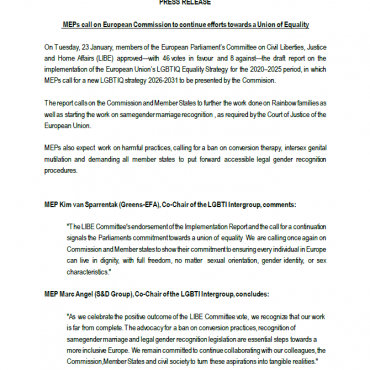European Parliament consents to EU-ACP partnership with reservations
Last week the European Parliament gave its legal consent to the updated Cotonou Agreement, a multilateral treaty between the EU and African, Caribbean and Pacific states. The Parliament expressed strong reservations about human rights in relation to sexual orientation.
The Cotonou Agreement governs diplomatic, trade and aid relationships between the EU and 79 African, Caribbean and Pacific states.
The treaty was last amended in 2010, and all EU and ACP Member States must now ratify it, and the European Parliament consent to it.
Article 8.4 of the revised Cotonou Agreement newly foresees including “political issues of mutual concern or of general significance” in joint talks, including “discrimination of any kind”.
But the new list of grounds fails to mention sexual orientation, something the European Parliament had demanded.
In a resolution adopted Thursday, the European Parliament gave its legal consent to the amended treaty, but expressed “its strongest reservations about parts of the Agreement which do not reflect the position of the European Parliament and the values of the Union”.
The Parliament “urge[d] all parties to revise the unsatisfactory clauses” in the update due in 2015, “including the explicit introduction of non-discrimination on the basis of sexual orientation”.
Michael Cashman MEP, Rapporteur for the European Parliament on the subject, explained: “The article on political dialogue wasn’t reworded in accordance with the Parliament’s wishes. The ACP side opposed including sexual orientation in the treaty, which is worrying since 38 ACP states still criminalise homosexuality.”
“The European Commission must now use the next two years before the third revision of the text to make progress on this crucial point.”
Michèle Striffler MEP, Shadow Rapporteur for the EPP group and a member of the LGBT Intergroup, added: “Non-discrimination is absolutely essential to our relationship with ACP countries, including on grounds of sexual orientation. Recent arrests and homophobic laws in Nigeria, Cameroon or Uganda show once again that we cannot make any compromise in this regard.”
Read more:







